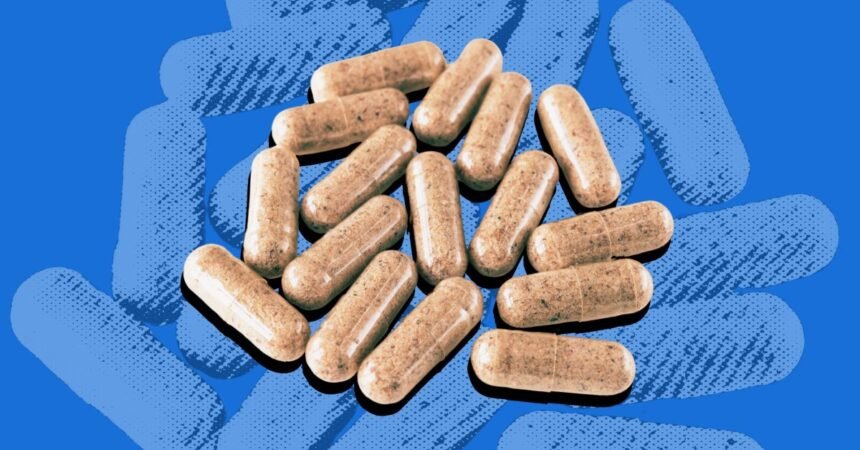Getting enough fiber is crucial for optimal health, yet more than 90% of Americans don’t. Federal dietary guidelines recommend 25–34 grams of fiber per day for adults, depending on age and gender—but the average American adult eats only about 8 grams a day, “which is far below recommended intake regardless of age or sex,” says Dr. Michelle Hughes, medical chief of quality and safety for digestive health at Yale New Haven Health and Smilow Cancer Hospital.
Should people seek to fill that gap with fiber supplements? Here’s what experts say you should know about supplementing this essential nutrient.
What is fiber, anyway?
Fiber is a type of carbohydrate that your body can’t digest. It’s found in plant foods, and “instead of being broken down and absorbed like other carbs, fiber moves through the digestive system, adding bulk to stool, feeding beneficial gut bacteria, and slowing the absorption of sugar into the bloodstream,” says Bree Phillips, a registered dietitian at University of California, San Francisco Health.
Read More: Is Beef Tallow Actually Good for You?
Eating too little can slow down the colon, says Dr. Omar Khokhar, gastroenterologist at OSF HealthCare, based in Illinois and Michigan. That may lead to diverticulosis and hemorrhoids. A low-fiber diet can also contribute to constipation, weight gain, obesity, bloating, and gas, and an increased risk of chronic diseases like diabetes, heart disease, and colorectal cancer.
Should you take a fiber supplement?
It’s best to get fiber from your diet. “Whole-food sources of fiber are ideal because they provide additional nutrients,” says Phillips. Whole foods also tend to contain a combination of both soluble and insoluble fiber. Soluble fiber, like the kind found in fruit and vegetables, dissolves in water to form a gel, while insoluble fiber—which comes from sources like grains—doesn’t dissolve.
But experts agree that some people who struggle to meet their daily fiber needs through food may benefit from supplementation. “This may help with GI function, and also with health benefits outside the GI tract, such as lowered cholesterol and regulation of blood sugar levels,” Khokhar says. Psyllium husk, found in powdered products such as Metamucil, and methylcellulose, found in Citrucel and its generic counterparts, generally have the most data supporting them, he adds.
Read More: Why Your Breakfast Should Start With a Vegetable
Some fiber supplements, such as psyllium husk and beta-glucans, have been shown to support health by improving cholesterol, digestion, and blood sugar levels, says Phillips. But the source and dose both matter. “Not all fiber supplements, even if they contain the same type of fiber, are created equal,” cautions Phillips. “Some may not contain the effective amount shown in research, and added ingredients like sugars or artificial sweeteners can impact tolerance and effectiveness.”
For instance, taking supplemental inulin—a type of soluble fiber found in plants—has been shown to cause gastrointestinal distress in some people and did “not consistently demonstrate protective effects” against colorectal cancer, says Hughes. Consult with a health care provider to choose the best supplement for you and to ensure it doesn’t interact with any medications you take.
What to look for in a fiber supplement
From gummies to powders, there’s a dizzying array of fiber supplements—in part, because there is no one “perfect” fiber supplement, says Dr. Anne Mongiu, co-director of the colorectal cancer program at Yale School of Medicine’s department of surgery. Considerations include taste, texture preferences, and tolerance, she says.
If a doctor advises you to take a fiber supplement, they can likely recommend an exact type and brand. In general, here’s how to pick the right fiber supplement, Mongiu says—and what to avoid.
- Evaluate the type of fiber: Fiber supplements are either derived from plants—such as psyllium, inulin, guar gum, flaxseed, or wheat dextrin—or from a synthetic source, such as methylcellulose. Plant-based or naturally-derived fiber is usually soluble fiber, which serves as a prebiotic and can support the health of gut bacteria and the microbiome. However, these can cause bloating and gassiness in some, so methylcellulose-based supplements can be a better option for some people.
- Consider the content: Look for fiber supplements that have at least 3 to 5 grams of the nutrient per serving. Some may have a lower content and therefore need to be taken multiple times a day, and others have a higher content for once-daily dosing. If you only plan to take a supplement once a day, it is probably best to select one with a higher amount of fiber to get the best effect.
- Scan the ingredients: Avoid supplements with extra sugars or other additives. There are many forms of fiber supplements, including powders, gummies, crackers, and cookies, and these sometimes contain unnecessary ingredients that can be harmful to your colon or overall health.
- Look for proof of quality control: The U.S. Food and Drug Administration does not regulate supplements as rigorously as they do medications. However, third-party certifications can help classify these products. Look for United States Pharmacopeia (USP) or NSF seals to ensure purity and quality.
Is it better to take a powder or a pill?
Many experts lean toward the powder form. “Fiber powders tend to be more versatile since they can be mixed into water, smoothies, or food, making it easier to consume a larger amount at once,” says Phillips. “They also often contain soluble fiber, which helps regulate digestion and support gut health.” Fiber pills can be more convenient for some but may contain smaller amounts of the nutrient per dose, meaning multiple pills may be needed to reach the same benefit as a scoop of powder.
Powdered formulations also allow for flexible dosing, so you can control exactly how much you’re getting and if you’re consuming it in one or more doses, Mongiu says. Above all, “I tell my patients that the best fiber supplement is the one that they are willing to take.”







